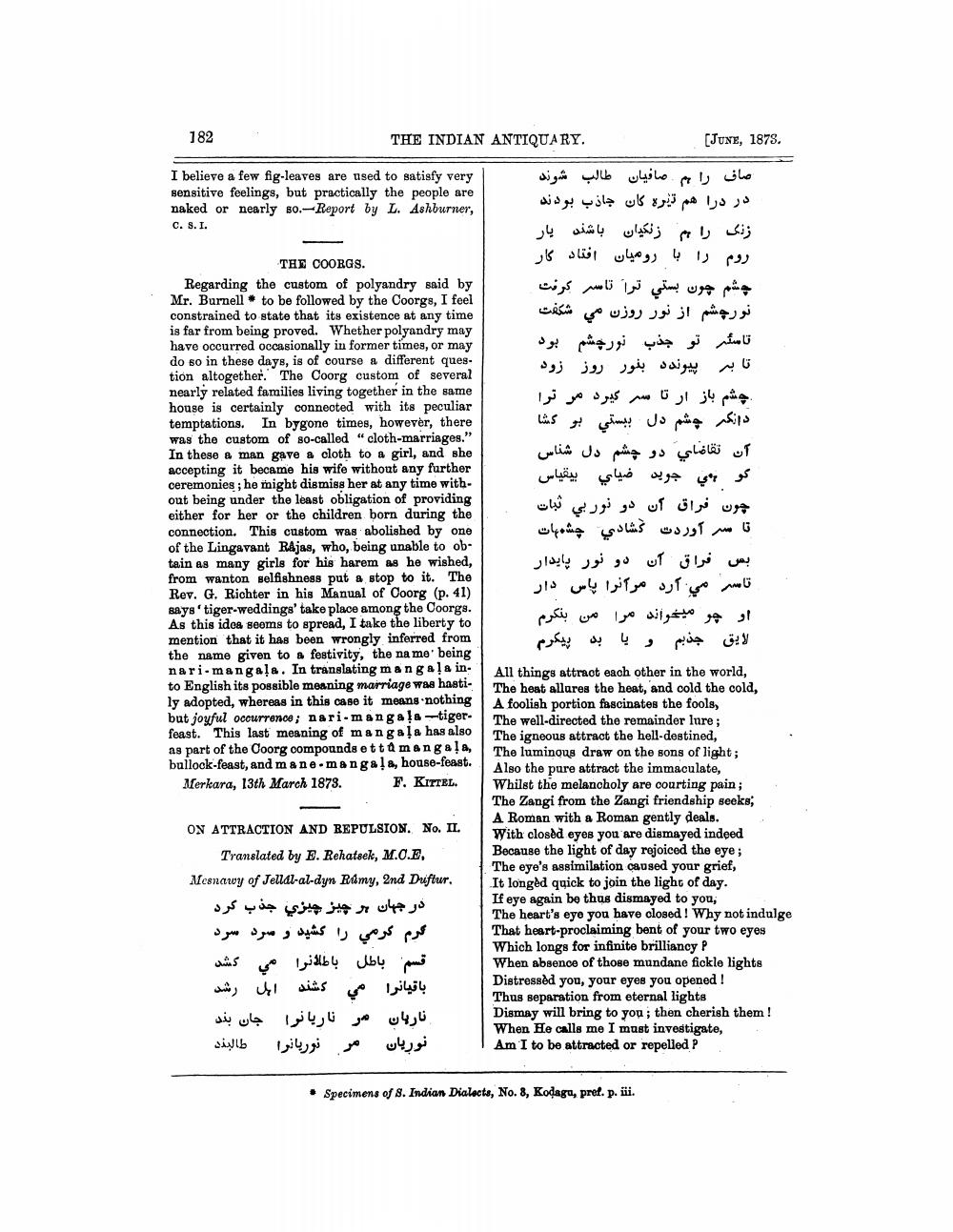________________
182
THE INDIAN ANTIQUARY.
[JUNE, 1873.
I believe a few fig-leaves are used to satisfy very sensitive feelings, but practically the people are naked or nearly 80.-Report by L. Ashburner, CS.I.
THE COORGS. Regarding the custom of polyandry said by Mr. Burnell * to be followed by the Coorgs, I feel constrained to state that its existence at any time is far from being proved. Whether polyandry may have occurred occasionally in former times, or may do so in these days, is of course a different ques. tion altogether. The Coorg custom of several nearly related families living together in the same house is certainly connected with its peculiar temptations. In bygone times, however, there was the custom of so-called "cloth-marriages." In these & man gave a cloth to a girl, and she accepting it became his wife without any further ceremonies; he might dismiss her at any time with. out being under the least obligation of providing either for her or the children born during the connection. This custom was abolished by one of the Lingavant Rajas, who, being unable to obtain as many girls for his harem as he wished, from wanton selfishness put a stop to it. The Rev. G. Richter in his Manual of Coorg (p. 41) says' tiger-weddings' take place among the Coorge. As this idea seems to spread, I take the liberty to mention that it has been wrongly inferred from the name given to a festivity, the name being nari mangala. In translating mangala in. to English its possible meaning marriage was hastily adopted, whereas in this case it means nothing but joyful occurrence; nari.mangala-tigerfeast. This last meaning of mangala has also as part of the Coorg compounds ett amangala, bullock-feast, and mane.mangala, house-feast.
Merkara, 13th March 1873. F. KITTEL.
شوند
طالب را هم صافیان صاف در درا هم تیره كان جاذب بودند
یار باشند زنکیان را هم زنی
كار
افتاد با رومیان
را روم چشم چون بستي ترا تاسر کرنت نور چشم از نور روزن مي شکفت تاسئہ تو جذب نور چشم بود
زود پیوندد بنور روز تا بر چشم باز ار تا سر کیرد مر ترا
بو کشا دانكر چشم دل ببستي ان تقاضاي دو چشم دل شناس
بيقیاس ضياي
جويد کو اي چون فراق آن در نور بي ثبات تا سر اور دت کشادي چشمهات
فراق آن دو نور پایدار بس
دار تا سر مي آرد مرا نرا پاس او چو میتواند مرا من بنگرم
پیکرم بد یا
و جذیم لايق
ON ATTRACTION AND REPULSION. No. II.
Translated by E. Rehatsek, M.O.E. Meenawy of Jellal-al-dyn Ramy, 2nd Duiftur.
All things attract each other in the world, The heat allares the heat, and cold the cold, A foolish portion fascinates the fools, The well-directed the remainder lure; The igneous attract the hell destined, The luminous draw on the sons of light; Also the pure attract the immaculate, Whilst the melancholy are courting pain; The Zangi from the Zangi friendship seeks; A Roman with a Roman gently deals. With closed eyes you are dismayed indeed Because the light of day rejoiced the eye; The eye's assimilation caused your grief, It longed quick to join the light of day. If eye again be thus dismayed to you, The heart's eye you have closed ! Why not indulge That heart-proclaiming bent of your two eyes Which longs for infinite brilliancy P When absence of those mundane fickle lights Distressed you, your eyes you opened! Thus separation from eternal lights Dismay will bring to you ; then cherish them! When He calls me I must investigate, Am I to be attracted or repelled P
در جهان ہر چیز چيزي جذب کرد کرم کرمي را کشید و سرد سرد
کشد
می باطلانرا باطل قسم
رشد
اہل کشند
مي باقیانرا
جان بند ناریا نرا
مر ناران
طالبند نوریانرا
مر نوریان
Specimens of 8. Indian Dialects, No. 8, Kodaga, pret. p. ii.




